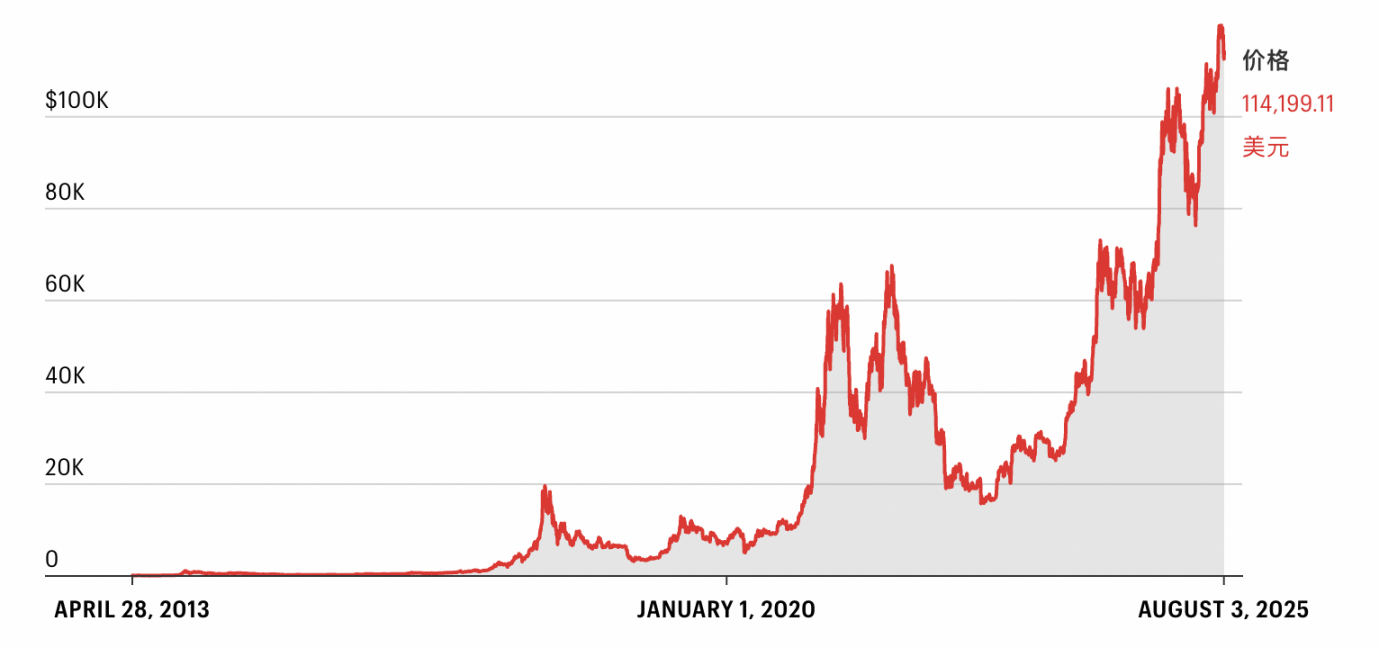Original article by Leo Schwartz, Fortune Magazine
Original translation: Luffy, Foresight News

Dan Morehead, Founder of Pantera Capital
In 2016, Dan Morehead embarked on a global tour, spreading the gospel of Bitcoin. A former Goldman Sachs and Tiger Management trader, he had been completely captivated by Bitcoin years earlier, convinced it would reshape the global economy. His belief in the currency was so strong that he even emerged from semi-retirement to transform his hedge fund, Pantera Capital, into one of the world's first Bitcoin funds.
The new venture launched in 2013 and enjoyed rapid early momentum, backed by two Princeton alumni, Pete Briger and Mike Novogratz, both from the private equity giant Fortress Investment Group. The trio watched with delight as Pantera's initial purchase of Bitcoin at $65 soared to over $1,000 by the end of the year. But then disaster struck: hackers robbed Mt. Gox, a major exchange in the nascent cryptocurrency industry, and the price of Bitcoin plummeted 85%. "People would say, 'Aren't you working on that dead Bitcoin?'" Morehead recalls. "It's still alive!" he would always respond.
During his 2016 Bitcoin tour, Morehead scheduled 170 meetings. Each time he walked into a potential investor's office, he spent an hour arguing why the new asset was a compelling opportunity. The result: he raised only $1 million for his struggling fund. To make matters worse, Morehead's own appearance fees totaled approximately $17,000. "I was making $100 per meeting just to convince people to buy Bitcoin," he told Fortune.
Less than a decade later, with the price of Bitcoin nearing $120,000, Morehead’s difficult early years have become part of the mythology of founders—on par with stories of Apple’s Steve Jobs and Steve Wozniak tinkering in Jobs’s parents’ garage, or Warren Buffett and Charlie Munger trading stock tips at an Omaha dinner.
Today, Pantera manages over $4 billion in assets across its various crypto funds , including holdings in digital assets like Bitcoin and Ethereum, as well as investments in projects like Circle (which went public in June) and Bitstamp (acquired by Robinhood for $200 million earlier this year). However, in the competitive crypto venture capital landscape, the firm's uniqueness lies in its pioneering position: a renowned bridge between the conservative world of traditional finance and the once-rebellious crypto industry. And its central figure, Morehead, stands out as a low-key, hands-on figure in an industry rife with legends.
“I was stubborn and had every intention of believing that [Bitcoin] was going to change the world,” Morehead told Fortune, “so I kept going.”
Bitcoin's wild ride

Bitcoin price trends since 2013. Data source: Coingecko
Princeton "Gangster"
In the pre-blockchain era, Wall Street had yet to penetrate the world of blockchain, and Morehead stood out in the chaotic world of early cryptocurrency. A former Princeton University athlete (both rugby and heavyweight rowing), he still retained the broad shoulders and square jawline of his youth. This was a stark contrast to the slender, eccentric individuals who spent their days on online forums. Instead, Morehead came from the world of traditional finance and was still accustomed to wearing a suit jacket.
Before he encountered Bitcoin, Morehead had a long trading career. After stints at Goldman Sachs and Tiger Management, he founded his own hedge fund, Pantera, which collapsed during the 2008 financial crisis. Around that time, a mysterious figure named Satoshi Nakamoto published a white paper online, introducing Bitcoin to the world.
Morehead first heard about Bitcoin from his younger brother in 2011. He also vaguely knew that his Princeton classmate, Gavin Andresen, ran a website where users could win 5 Bitcoins (currently worth about $575,000) by cracking a CAPTCHA. But he didn't pay much attention until a few years later, when another classmate, Briger, invited him to Fortress Investment Group's San Francisco office for coffee to discuss cryptocurrency. Novogratz also joined remotely. "From then on, I was fascinated by Bitcoin," Morehead says.
The tech world is known for its so-called "Mafia," like the PayPal Mafia, which later dominated the next generation of startups. In crypto, the "Mafia" doesn't come from a single company, but rather a university: Princeton has nurtured some of the industry's most influential projects. Both Briger and Novogratz were key backers of Pantera , with Morehead even moving into a vacant space in Fortress Investments' San Francisco office. Briger maintains a behind-the-scenes influence in crypto, recently joining the board of Michael Saylor's $100 billion Bitcoin holding company, Strategy. Novogratz founded Galaxy, which has become one of the largest crypto conglomerates. Another classmate, Joe Lubin, later co-founded Ethereum .
But in 2013, the idea that Ivy League graduates, active in high-profile fields like private equity and macro trading, would be interested in Bitcoin still seemed far-fetched. Briger told Fortune that he first heard about Bitcoin from Wences Casares, an Argentinian entrepreneur and early cryptocurrency enthusiast, while the two shared a room at a Young Presidents' Organization gathering in the San Juan Islands. Briger quickly saw its potential to disrupt the global payments system, a view he still holds, even though he believes Bitcoin is still in its infancy. He compares Bitcoin's promise to the internet, which enabled new forms of information dissemination. "It's a shame that the way money moves hasn't caught up," he says.
After sharing this idea with Novogratz, they decided that Morehead, with his experience in the foreign exchange market, was the right person to take the helm. When Morehead decided to dedicate the rest of his financial career to crypto, he repositioned Pantera as a Bitcoin fund, opening it to outside investors. Briger and Novogratz both joined as limited partners, while Fortress Investments, Benchmark, and Ribbitt Investments joined as general partners (later exiting). His mentor at Tiger Global Management, legendary investor Julian Robertson, also invested in a later fund.
The Rebirth of Pantera
In the early days of cryptocurrency, entrepreneurs had to contend with wild market swings that make today’s volatility seem like a minor ripple. But Novogratz recalls that the biggest hassle wasn’t the price rollercoaster, but the inability to buy Bitcoin at all.
He approached Coinbase, then only a year old, to buy 30,000 bitcoins, then worth about $2 million. A pop-up window appeared, stating his limit was $50. After consulting with Olaf Carlson-Wee, Coinbase's first employee and a prominent figure in the cryptocurrency world, Coinbase agreed to raise his limit to $300.
Perhaps Morehead's most impressive achievement, however, was persevering through the downturn of 2013 to 2016, when Bitcoin's price was low and nobody outside the closed blockchain community cared about it. "Dan was out there during those quiet years in crypto," Novogratz told Fortune.
That era also had its highlights, including three annual conferences hosted by Morehead at his home in Lake Tahoe. During one of these, Jesse Powell, founder of the exchange Kraken, chose to fly instead of a private jet chartered by Morehead. "There were quite a few members of the Bitcoin community on the plane, and he was worried that if it crashed, Bitcoin would be doomed," Morehead recalls.
Unlike many of his peers, Morehead has never considered himself a "Bitcoin maximalist" (someone who argues that other cryptocurrencies shouldn't exist). After acquiring 2% of the global Bitcoin supply, Pantera became an early investor in Ripple Labs, the company behind the digital currency XRP. "My thinking is that Bitcoin is obviously the most important," Morehead says, "but there's more than one internet company."
According to Morehead, 86% of Pantera's venture-backed projects have been profitable. This is a staggering figure, considering the vast majority of venture-backed startups fail. Cryptocurrency is perhaps more forgiving, as many projects hold cryptocurrency, meaning that even if a startup's product fails, the investment value often persists.
Morehead now spends half his time each year in Puerto Rico, which has become a hotbed for cryptocurrencies. Joey Krug, then a Pantera partner and now at Peter Thiel's Founders Fund, had already moved there, prompting Morehead to follow suit. He estimates there are 1,000 blockchain entrepreneurs on the island, but they have come under scrutiny for driving up real estate prices. Morehead was investigated by the Senate Finance Committee over whether he violated federal tax laws by moving to the island and reaping over $850 million in capital gains from Pantera. He told The New York Times earlier this year that he believed he had "behaved appropriately with respect to taxes" but declined to comment further to Fortune.
The future of Bitcoin
Morehead acknowledges that the crypto industry is rife with gambling, and Pantera isn't involved in meme coins like many venture capital firms. However, he argues that this shouldn't obscure blockchain's broader goal of reshaping global finance. "To think the blockchain industry could be brought down by a minor quirk is ridiculous," he says. "The GameStop incident doesn't mean the entire US stock market is in trouble."
Pantera continues its expansion, including raising its fifth venture capital fund with a $1 billion target. Morehead said the fund will close later this year after completing investments from its fourth fund. Pantera has also entered the hotly sought-after digital asset treasury sector, where public companies add cryptocurrencies to their balance sheets.
But Bitcoin remains at the core of Pantera's strategy. At the end of last year, its Bitcoin fund achieved a 1,000-fold return, with cumulative returns exceeding 130,000%. When asked about Bitcoin's future price, Morehead's answer remains consistent: double within a year. This simple model generally works, though he acknowledges that the momentum may be slowing. He believes Bitcoin will still rise another order of magnitude, approaching $1 million, but this will be the last 10-fold increase.
If Bitcoin never reaches that milestone, Morehead is willing to take the heat. After all, in 2016, he was still making the case for $500 Bitcoin. Less than a decade later, he's only just getting started. "I believe the vast majority of institutions are just beginning to embrace Bitcoin," he told Fortune. "We still have decades to go."
- 核心观点:Dan Morehead坚信比特币将重塑全球经济。
- 关键要素:
- 2013年创立首批比特币基金之一。
- 2016年全球宣讲比特币,筹资艰难。
- Pantera Capital管理40亿美元加密资产。
- 市场影响:推动传统金融与加密行业融合。
- 时效性标注:长期影响。



